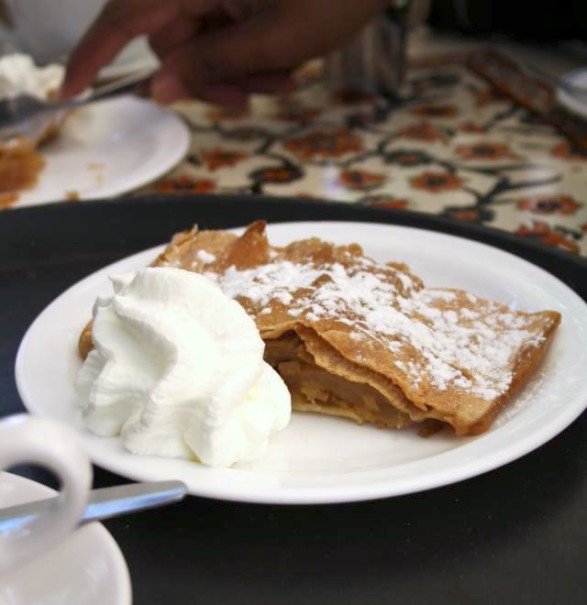
A Slice of the Old World in an Even Older City

A Slice of the Old World in an Even Older City
Apfelstrudel in Jerusalem
Perched atop the terrace of the Austrian Hospice, a sense of awe and wonderment engulfed me. The vantage point offers a sweeping, panoramic vista of Jerusalem’s Old City, swathes of white- and sand-colored dolomite interspersed by three imposing structures: The Dome of the Rock, the Al Aqsa Mosque, and The Church of the Holy Sepulchre. I resist the urge to take a photograph right away, overwhelmed by the syncretism on display and the majestic view. Our motley group of seven, accompanied by our guide Aviham, set out on a Tuesday to explore the Old City on foot; the Viennese café at the hospice is our pitstop for breakfast.
The Austrian Hospice, established in 1854, is located at the intersection of Via Dolorosa and Al-Wad Street. Known as a “pilgrims’ hostel,” it was thrown open to visitors in 1863. We make our way to the café through lancet archways, elaborately painted friezes, and empty corridors charged with a piercing silence, punctuated only by Old World candelabras suspended from the ceiling and warm smiles from geriatric nuns. The hospice served as an internment camp for priests during World War II, Aviham tells us, and functioned as a military hospital in 1948.
However, it is not the history alone that entices me; I am here for the apple strudel and coffee, fuel before we set out to explore the four quarters of the Old City. Orders placed, we listen to Aviham’s intriguing snippets of facts. For instance, in 1869, Emperor Franz Josef of the Habsburg monarchy stayed at the Hospice, the first crowned ruler of a Catholic country to visit Jerusalem since the Crusades.
The café doesn’t possess the Viennese coffeehouse staples: don’t go searching for Thonet chairs or piano jazz tunes, Jugendstil ceramics or waiters decked in bow ties. However, the al fresco space is a sensorial experience in itself. Trees are abloom with bougainvillea and honeysuckle blossoms, the leaves creating a rustling percussion in the light breeze. Nine square Azulejo tiles are joined together to form a floral pattern on every tabletop. Soft natural light filters in through the arches, outlining shadows on the walls. The din of vendors peddling their wares at the marketplace below gradually filters out. Single diners engage themselves in reading, writing, or the sublime pastime of people-watching. A curly-haired young man at a corner table paints en plein air.
Plates of the strudel arrive. There is a discernable hint of nutmeg and cinnamon in every bite. Freshly stewed tart apples and plump raisins are encased in delicate sheets of hand-rolled phyllo pastry, baked to a golden-brown, dusted with powdered sugar, and served warm with a generous dollop of whipped cream.
The café prides itself on using the medium roast coffee from Julius Meinl—a 153-year-old coffee company based out of Vienna—for all its brews. An array of different coffees is on offer, from the Einspänner, a strong, black coffee with a swirl of whipped cream to an Eiskaffee, cold coffee with chocolate and cream. I settle for a fuss-free cortado, a medium Vienna roast. Aromatic and subtly caramelized, it is served in a Gibraltar glass. Cut with a little milk to tone down the espresso, it is a pleasant cross between a café latte and a macchiato, and perfectly undercuts the slight sweetness of the strudel.
In a country that is more often than not in flux, the café seems like a place of refuge, an enclave for reflection and introspection, where it is best not to keep track of time. The English translation of the German word Ankunft is arrival. Markus Stephan Bugnyar, the current rector of the Hospice, is perhaps right when he says, “The word arrival stands as much for the initial arrival of an epoch-making idea in 1854 [the foundation of the Hospice], as for the individual arrival of every one of our guests.” Here, one’s arrival could possibly be for a short stay at the Hospice, to attend a Mass—conducted in Latin or German—at the in-house chapel, to marvel at the 14 paintings of the Station of the Cross on the second floor, or simply to relish the apfelstrudel, a cup of coffee, and stillness.